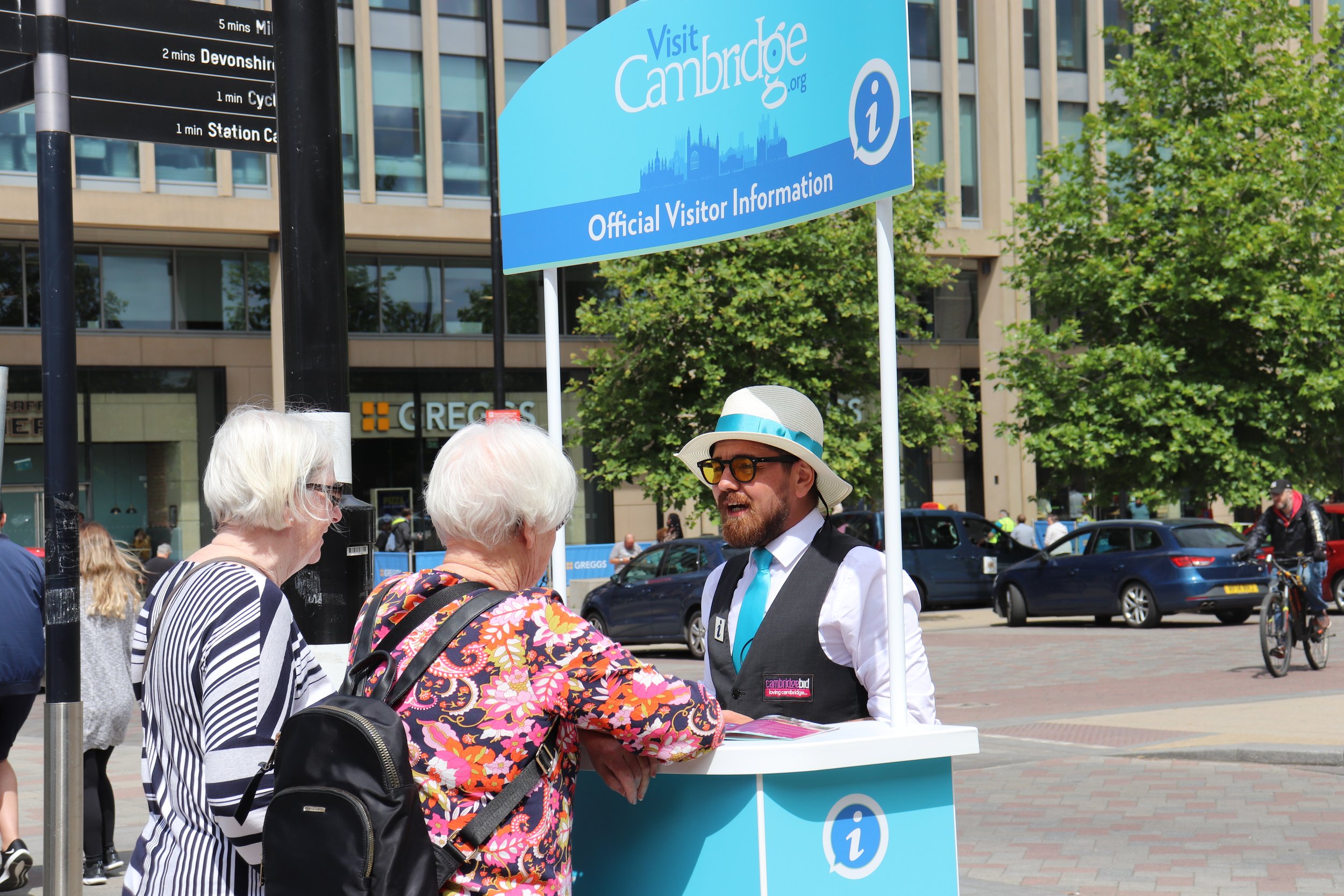






Over the past few months, you may have picked up on the conversation about an ABID (Accommodation BID)/ Visitor Levy being introduced in the City. This is something Cambridge BID is exploring as a way of funding Visit Cambridge and the development and management of greater Cambridge as a destination, shifting the funding from the businesses and public sector to the visitor. This is a common practice across Europe and North America, and was introduced successfully in Manchester in April 2023, with an increasing number of cities and regions in England now looking at the model.
The new ABID will not replace the current Cambridge BID, the two will work alongside each other for the benefit of Cambridge City and greater Cambridge.
We hope the following will help address any of the questions you may have about the developing ABID in greater Cambridge.
If you do have any other questions please contact: maria.manion@cambridgebid.co.uk
What is a BID?
A BID is a Business Improvement District. They originated in Canada and from there they were developed in the USA and then in the UK. In the USA they were used to regenerate towns and cities as public sector investment diminished. There are over 350 BIDs across the UK, the majority are based in towns and city centres. BIDs are voted in by the businesses within a defined geographical area. The businesses in the defined area are consulted, a business plan is developed and businesses vote on that plan.
For the vote to be successful from the businesses that ballot, at least 50% of the votes need to be YES votes and also be at least 50% of the ratable value of the total ratable value of the businesses balloted. Both the YES and ratable value must be achieved otherwise the BID cannot proceed.
Businesses pay an annual levy based on their ratable value. This levy is payable annually for 5 years, each BID is required to go back to ballot every 5 years. The BID levy is used to deliver the projects outlined in the business plan.
What is an ABID?
An ABID is an Accommodation BID. It uses BID legislation to define an operating area and the businesses included. In an ABID the businesses are hotels. As with a BID, a business plan is produced and the businesses vote on that business plan.
For the purposes of the Cambridge ABID what is a hotel? more than 10 rooms, with a ratable value over £34,500 and where the core function of the businesses is a hotel.
The proposal excludes businesses operating as Guests Houses (less than 10 rooms), pubs which include guest rooms, and where the rooms are not the core business; Airbnb – many of these are within the domestic rating system, this proposal relates to properties within the Business Rate system.
What is the area the ABID will cover?
The area we are looking at includes businesses in the local authority areas of Cambridge City Council and South Cambridgeshire District Council.
The businesses in the area have a relationship with Cambridge the destination, and its visitors, whether that’s businesses or leisure who will be using their hotels because of its relationship with the City.
What is the difference between a BID and ABID?
A BID’s levy is based on the ratable value of the business, a percentage, in Cambridge this is currently 1.25%. It is paid by the business to the BID, on an annual basis. The Council collects the levy on the BIDs behalf.
With an ABID, a levy is placed on the room and is collected by the hotel from the visitor. An average occupancy rate is established using a database which the hotels sign up to called STR. We will use average occupancy from the STR data and the number of rooms to calculate the levy. The businesses then pay quarterly in arrears. An ABID levy is paid by the visitor to the hotel, which is then paid to the BID. The Council collects the levy on behalf of the ABID.
The main difference is with the ‘traditional’ BID the levy is paid by the business, whereas with an ABID the levy is paid by the visitor not the business.
Will the ABID replace the BID?
No, the ABID, which you currently know as Visit Cambridge will work alongside Cambridge BID. There may be some projects and events where the two organizations support each other, which will mean additional investment in events and activities in the City and greater Cambridge.
Where will the money raised from the ABID be spent?
The project and theme areas for investment are developed in consultation with the businesses, the three themes emerging are Destination Investment; Profile and, Product Development & distribution. The money raised will be spent locally on supporting, managing and developing the visitor economy in the greater Cambridge area. All the monies collected will be invested locally.
Why do we need an ABID?
Tourism is an important part of the greater Cambridge economy and supports the economic and social development of the broader City. Visit Cambridge came into being following the demise of Visit Cambridge and Beyond in 2020. Four partners secured the assets following the liquidation of Visit Cambridge and beyond, the City Council, Cambridge BID, Fitzwilliam and Kings College. These partners operate under a CIC, a Community Interest Company and have no staff or funding for the development of Visit Cambridge and the destination.
The current day to day management and Visit Cambridge projects are funded by Cambridge BID. These activities include providing the visitor welcome and is currently just a tip of the iceberg as to what can actually be achieved, delivered and managed. The current spend and priorities do favour those businesses within the Cambridge BID area – with some benefit reaching the periphery areas.
The previous structure relied on partnership funding and memberships. These funding streams were reduced and then withdrawn, making the former organization unsustainable.
Investment in destination management and the city is required, this option provides a funding stream where the visitor rather than the business pays. It also provides a sustainable funding stream over a five year period and reduces the financial pressure on businesses and the public sector.
What level of funding can an ABID potentially raise?
This will depend on the occupancy level applied and levy.
We are currently looking at a levy of £2 (inclusive of VAT) per room in yrs 1 &2, and £3 (inclusive of VAT) per room in yrs 3,4, & 5. Based on an occupancy rate of 66% to 76% in the first two years the ABID could raise between £1.5m to £2m pa and in years 3,4 and 5 the income raised could be up to £2.7m pa.
This money would be directly invested back into the greater Cambridge area.
Are there any other ABIDs in the UK?
There is an ABID in Manchester – this is the first city/destination to use BID legislation. The ABID in Manchester places a room levy of £1 and raises an income of £3.5m per annum.
We understand that Bournemouth, Poole and Christchurch will be going to ballot in April, Chester in May/June and potentially Nottingham in September. There are at least 16 other cities and destinations currently looking at utilising ABID legislation.
The ABID in Manchester has completed its first year of operating, it has been well received and has delivered against its business plan.
What happens if there is no ABID?
If the ABID doesn’t proceed, the work which the BID can undertake is going to be limited, as is the benefit to the greater Cambridge area. The funding structure of Visit Cambridge would have to be reconsidered, and there would be some expectation of business and the local authorities to contribute to the development of Visit Cambridge and the Destination Management Organisation.
There would also be limited resources to deliver the current emerging Destination Management Plan and it is unlikely that it would be able to meet the requirements to be recognised within the national tourism structures.
Businesses would not have the co-ordinated voice which could influence key areas such as transport and destination management.
This is an opportunity for the greater Cambridge area to secure a sustainable funding stream which removes the pressure from the businesses and places the responsibility on the visitor, a funding model which is currently up and running in Manchester and is being explored by at least 16 other cities and areas across the Country, and a model that is commonly in use across Europe and USA.
Will having an ABID in Cambridge be detrimental to my business?
The evidence from Manchester and cities across Europe is that it will not have a negative impact on businesses in the City and surrounding area, there will be additional investment in the City, in the long term we hope this will have a positive impact on the City and its environs.


